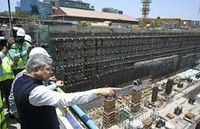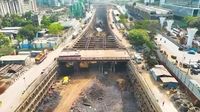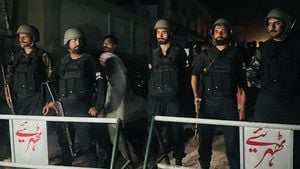Construction is rapidly progressing on India's first bullet train project, the Mumbai-Ahmedabad High-Speed Rail Corridor, as Union Minister of Railways, Ashwini Vaishnaw, recently inspected the work at the Bandra Kurla Complex (BKC) in Mumbai. This ambitious project, which spans 508 kilometers, is set to redefine travel between the two major cities, drastically reducing the journey time to just three hours.
During his visit on May 5, 2025, Vaishnaw provided a detailed update on the construction status, emphasizing that the primary underground work is complete. He noted significant milestones achieved at the BKC station, which is the only underground station on the bullet train route. Notably, 75 percent of the excavation work has been finished, amounting to over 14 lakh cubic meters of earth removed, and 100 percent of secant piling has been completed with 3,384 piles installed to stabilize the site.
In his statement on X, Vaishnaw highlighted, "Work on the bullet train’s origin station at Mumbai’s BKC is progressing rapidly. Tunnel construction is also moving swiftly, and in the Maharashtra section beyond the tunnel, all remaining work is picking up pace now that land acquisition is complete.” The underground station will feature three basement levels: B3 for train parking, B2 for operational activities, and B1 for passenger access, alongside the ground floor.
The total cost of the Mumbai-Ahmedabad bullet train project is estimated at Rs 1.08 lakh crore, with the central government contributing Rs 10,000 crore, while both Maharashtra and Gujarat will invest Rs 5,000 crore each. A significant portion of the funding comes from a loan from Japan at a nominal interest rate of 0.1 percent. The National High Speed Rail Corporation Limited (NHSRCL) is responsible for implementing the project.
The bullet train will connect 12 stations, including Mumbai, Thane, Virar, Boisar, Vapi, Billimora, Surat, Bhaurach, Vadodara, Anand, Ahmedabad, and Sabarmati. This project not only aims to enhance connectivity but is also expected to stimulate economic growth in the regions it traverses.
In addition to the construction of the BKC station, the project is advancing on other fronts as well. Alstom Transport – Larsen & Toubro JV and DRA Infracon – Siemens JV recently submitted bids for the signalling and telecommunication (S&T) system contract, Package S-1. This contract, which was tendered by NHSRCL in January 2025, has a deadline of 2555 days, or approximately seven years.
The scope of Package S-1 includes the design, manufacture, supply, installation, overall integration, testing, commissioning, and comprehensive maintenance of the signalling and train control system, telecommunication system, and operation control center system for the Mumbai-Ahmedabad High-Speed Rail Project. The technical bids were opened last week, revealing that the Alstom–L&T JV and DRA–Siemens JV are the only two bidders for this critical contract.
The bids are currently undergoing technical evaluation, and once this process is complete, the financial bids of the technically qualified bidders will be opened to determine the lowest bidder.
On another front, SCC-Capacit’e (JV) has received a letter of acceptance from NHSRCL for a contract valued at Rs 384.72 crore, excluding GST. This contract involves the design and construction of maintenance cum technology centers at six locations in Gujarat as part of the Mumbai-Ahmedabad High-Speed Rail Project. SCC Infrastructure holds a 60 percent share as the lead partner, while Capacit’e Infraprojects holds a 40 percent share.
Rahul Katyal, Managing Director of Capacit’e Infraprojects, expressed optimism about the project, stating, "This signifies an important milestone in our client expansion and strengthens our position as a preferred partner for marquee projects. With a strong track record of project delivery, we’re confident in our ability to meet timelines and exceed client expectations.”
As the Mumbai-Ahmedabad High-Speed Rail project continues to gain momentum, it reflects India's commitment to modernizing its transportation infrastructure and enhancing connectivity between major urban centers. The completion of this project is eagerly anticipated not just for its economic benefits but also for its potential to transform travel experiences across the region.
With construction well underway and significant contracts being awarded, stakeholders are optimistic about meeting the ambitious timelines set for the project. As the country moves towards a future of high-speed rail travel, the Mumbai-Ahmedabad corridor stands as a testament to India's growing capabilities in infrastructure development.





